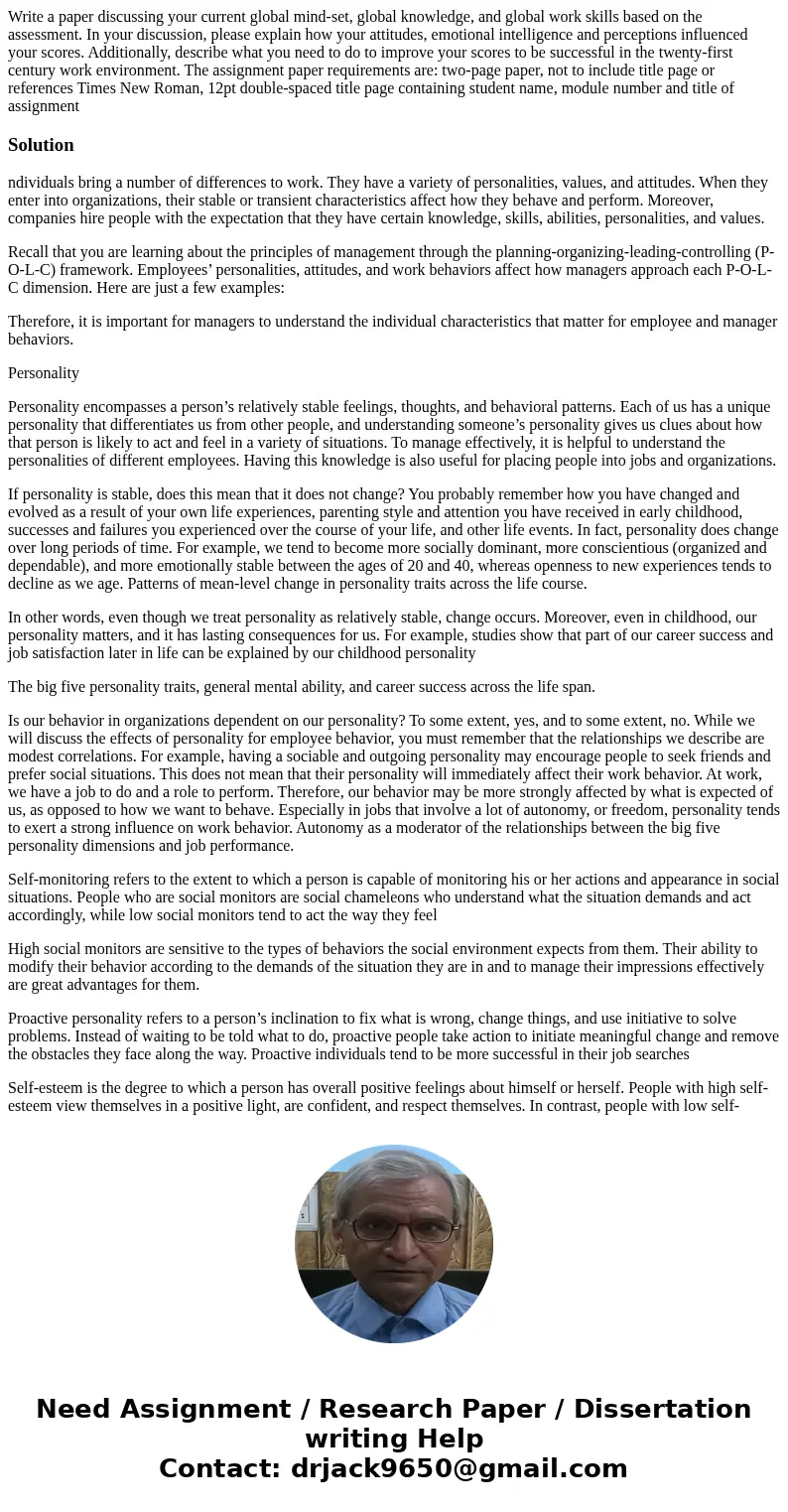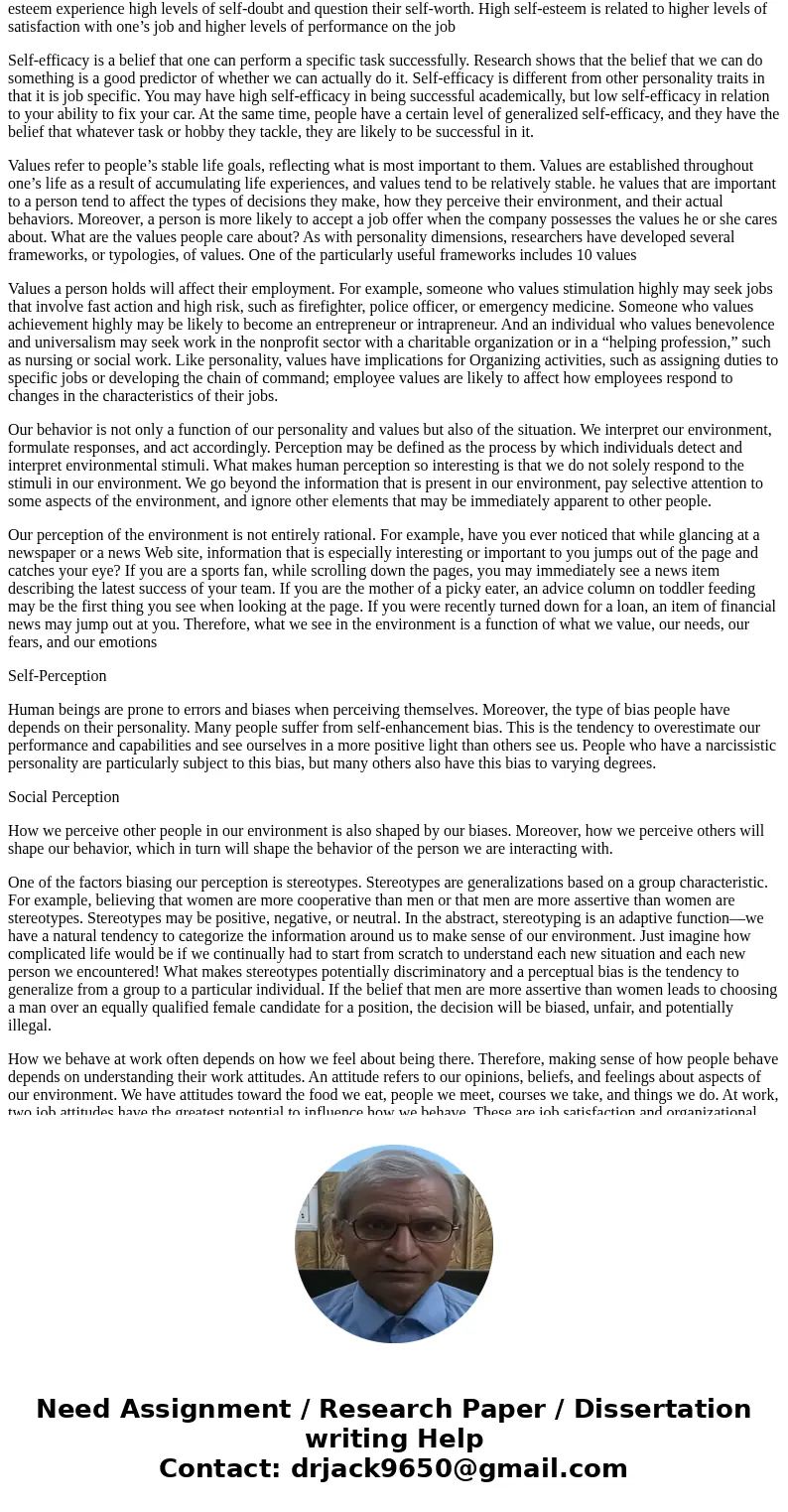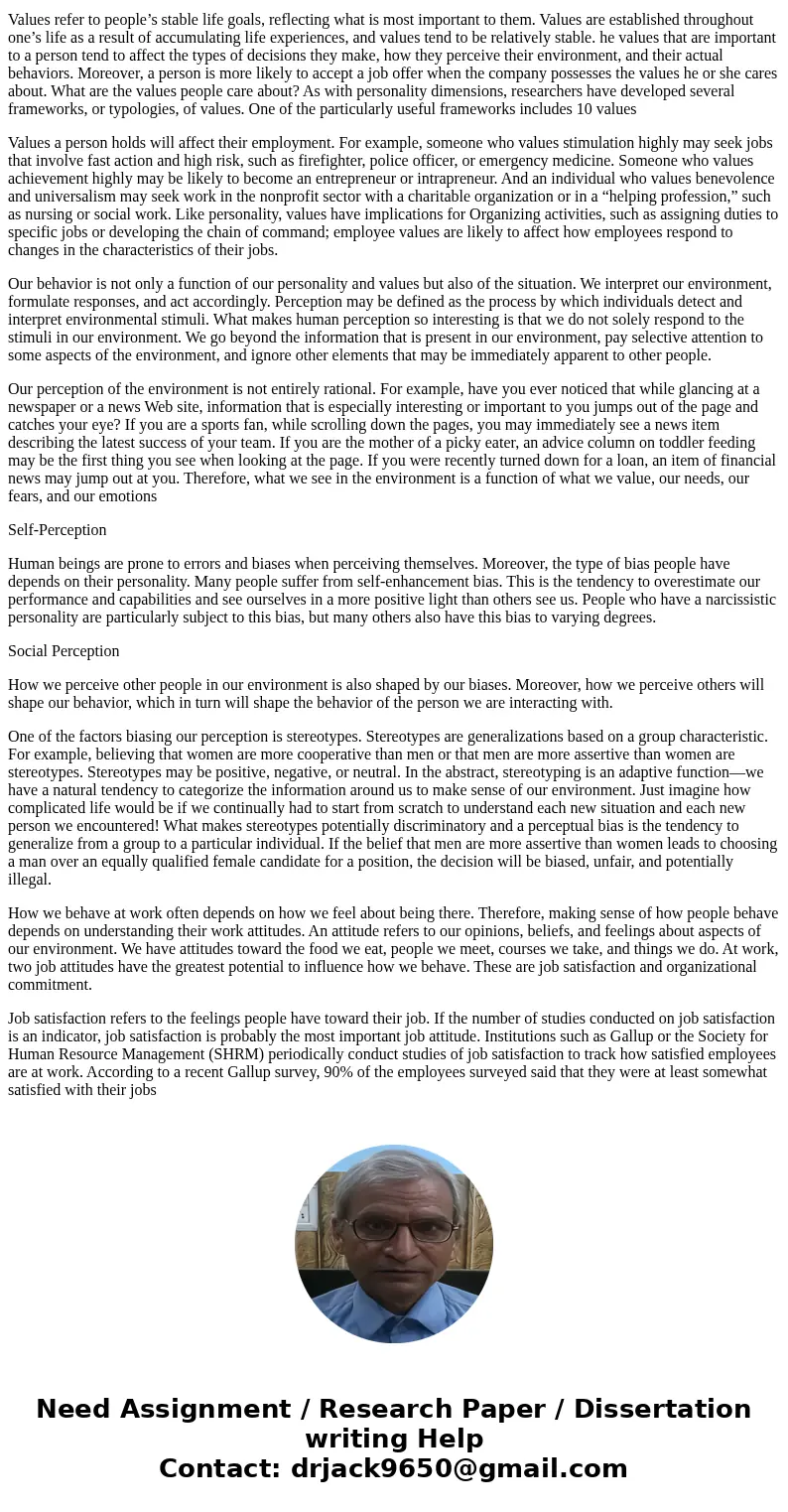Write a paper discussing your current global mindset global
Write a paper discussing your current global mind-set, global knowledge, and global work skills based on the assessment. In your discussion, please explain how your attitudes, emotional intelligence and perceptions influenced your scores. Additionally, describe what you need to do to improve your scores to be successful in the twenty-first century work environment. The assignment paper requirements are: two-page paper, not to include title page or references Times New Roman, 12pt double-spaced title page containing student name, module number and title of assignment
Solution
ndividuals bring a number of differences to work. They have a variety of personalities, values, and attitudes. When they enter into organizations, their stable or transient characteristics affect how they behave and perform. Moreover, companies hire people with the expectation that they have certain knowledge, skills, abilities, personalities, and values.
Recall that you are learning about the principles of management through the planning-organizing-leading-controlling (P-O-L-C) framework. Employees’ personalities, attitudes, and work behaviors affect how managers approach each P-O-L-C dimension. Here are just a few examples:
Therefore, it is important for managers to understand the individual characteristics that matter for employee and manager behaviors.
Personality
Personality encompasses a person’s relatively stable feelings, thoughts, and behavioral patterns. Each of us has a unique personality that differentiates us from other people, and understanding someone’s personality gives us clues about how that person is likely to act and feel in a variety of situations. To manage effectively, it is helpful to understand the personalities of different employees. Having this knowledge is also useful for placing people into jobs and organizations.
If personality is stable, does this mean that it does not change? You probably remember how you have changed and evolved as a result of your own life experiences, parenting style and attention you have received in early childhood, successes and failures you experienced over the course of your life, and other life events. In fact, personality does change over long periods of time. For example, we tend to become more socially dominant, more conscientious (organized and dependable), and more emotionally stable between the ages of 20 and 40, whereas openness to new experiences tends to decline as we age. Patterns of mean-level change in personality traits across the life course.
In other words, even though we treat personality as relatively stable, change occurs. Moreover, even in childhood, our personality matters, and it has lasting consequences for us. For example, studies show that part of our career success and job satisfaction later in life can be explained by our childhood personality
The big five personality traits, general mental ability, and career success across the life span.
Is our behavior in organizations dependent on our personality? To some extent, yes, and to some extent, no. While we will discuss the effects of personality for employee behavior, you must remember that the relationships we describe are modest correlations. For example, having a sociable and outgoing personality may encourage people to seek friends and prefer social situations. This does not mean that their personality will immediately affect their work behavior. At work, we have a job to do and a role to perform. Therefore, our behavior may be more strongly affected by what is expected of us, as opposed to how we want to behave. Especially in jobs that involve a lot of autonomy, or freedom, personality tends to exert a strong influence on work behavior. Autonomy as a moderator of the relationships between the big five personality dimensions and job performance.
Self-monitoring refers to the extent to which a person is capable of monitoring his or her actions and appearance in social situations. People who are social monitors are social chameleons who understand what the situation demands and act accordingly, while low social monitors tend to act the way they feel
High social monitors are sensitive to the types of behaviors the social environment expects from them. Their ability to modify their behavior according to the demands of the situation they are in and to manage their impressions effectively are great advantages for them.
Proactive personality refers to a person’s inclination to fix what is wrong, change things, and use initiative to solve problems. Instead of waiting to be told what to do, proactive people take action to initiate meaningful change and remove the obstacles they face along the way. Proactive individuals tend to be more successful in their job searches
Self-esteem is the degree to which a person has overall positive feelings about himself or herself. People with high self-esteem view themselves in a positive light, are confident, and respect themselves. In contrast, people with low self-esteem experience high levels of self-doubt and question their self-worth. High self-esteem is related to higher levels of satisfaction with one’s job and higher levels of performance on the job
Self-efficacy is a belief that one can perform a specific task successfully. Research shows that the belief that we can do something is a good predictor of whether we can actually do it. Self-efficacy is different from other personality traits in that it is job specific. You may have high self-efficacy in being successful academically, but low self-efficacy in relation to your ability to fix your car. At the same time, people have a certain level of generalized self-efficacy, and they have the belief that whatever task or hobby they tackle, they are likely to be successful in it.
Values refer to people’s stable life goals, reflecting what is most important to them. Values are established throughout one’s life as a result of accumulating life experiences, and values tend to be relatively stable. he values that are important to a person tend to affect the types of decisions they make, how they perceive their environment, and their actual behaviors. Moreover, a person is more likely to accept a job offer when the company possesses the values he or she cares about. What are the values people care about? As with personality dimensions, researchers have developed several frameworks, or typologies, of values. One of the particularly useful frameworks includes 10 values
Values a person holds will affect their employment. For example, someone who values stimulation highly may seek jobs that involve fast action and high risk, such as firefighter, police officer, or emergency medicine. Someone who values achievement highly may be likely to become an entrepreneur or intrapreneur. And an individual who values benevolence and universalism may seek work in the nonprofit sector with a charitable organization or in a “helping profession,” such as nursing or social work. Like personality, values have implications for Organizing activities, such as assigning duties to specific jobs or developing the chain of command; employee values are likely to affect how employees respond to changes in the characteristics of their jobs.
Our behavior is not only a function of our personality and values but also of the situation. We interpret our environment, formulate responses, and act accordingly. Perception may be defined as the process by which individuals detect and interpret environmental stimuli. What makes human perception so interesting is that we do not solely respond to the stimuli in our environment. We go beyond the information that is present in our environment, pay selective attention to some aspects of the environment, and ignore other elements that may be immediately apparent to other people.
Our perception of the environment is not entirely rational. For example, have you ever noticed that while glancing at a newspaper or a news Web site, information that is especially interesting or important to you jumps out of the page and catches your eye? If you are a sports fan, while scrolling down the pages, you may immediately see a news item describing the latest success of your team. If you are the mother of a picky eater, an advice column on toddler feeding may be the first thing you see when looking at the page. If you were recently turned down for a loan, an item of financial news may jump out at you. Therefore, what we see in the environment is a function of what we value, our needs, our fears, and our emotions
Self-Perception
Human beings are prone to errors and biases when perceiving themselves. Moreover, the type of bias people have depends on their personality. Many people suffer from self-enhancement bias. This is the tendency to overestimate our performance and capabilities and see ourselves in a more positive light than others see us. People who have a narcissistic personality are particularly subject to this bias, but many others also have this bias to varying degrees.
Social Perception
How we perceive other people in our environment is also shaped by our biases. Moreover, how we perceive others will shape our behavior, which in turn will shape the behavior of the person we are interacting with.
One of the factors biasing our perception is stereotypes. Stereotypes are generalizations based on a group characteristic. For example, believing that women are more cooperative than men or that men are more assertive than women are stereotypes. Stereotypes may be positive, negative, or neutral. In the abstract, stereotyping is an adaptive function—we have a natural tendency to categorize the information around us to make sense of our environment. Just imagine how complicated life would be if we continually had to start from scratch to understand each new situation and each new person we encountered! What makes stereotypes potentially discriminatory and a perceptual bias is the tendency to generalize from a group to a particular individual. If the belief that men are more assertive than women leads to choosing a man over an equally qualified female candidate for a position, the decision will be biased, unfair, and potentially illegal.
How we behave at work often depends on how we feel about being there. Therefore, making sense of how people behave depends on understanding their work attitudes. An attitude refers to our opinions, beliefs, and feelings about aspects of our environment. We have attitudes toward the food we eat, people we meet, courses we take, and things we do. At work, two job attitudes have the greatest potential to influence how we behave. These are job satisfaction and organizational commitment.
Job satisfaction refers to the feelings people have toward their job. If the number of studies conducted on job satisfaction is an indicator, job satisfaction is probably the most important job attitude. Institutions such as Gallup or the Society for Human Resource Management (SHRM) periodically conduct studies of job satisfaction to track how satisfied employees are at work. According to a recent Gallup survey, 90% of the employees surveyed said that they were at least somewhat satisfied with their jobs



 Homework Sourse
Homework Sourse